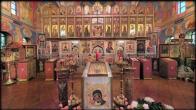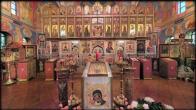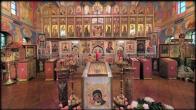You are here
Notes on the Liturgy and the Church
S.I.Fudel
Chapter 10
After the reading of the Gospel and the ectenias that follow (one of them known as the "augmented litany," in which "Lord have mercy" is chanted thrice after each petition), prayers for the "catechumens" begin. In our days, this part of the Liturgy can be seen as a merely-ritual token of what had once been an actual living part [of the Liturgy].
[St. John] Chrysostom says the following about the richness of the early Christian life as compared to his day (the close of the 4th Century): "Then, the Church was the Heavens. The Spirit arranged everything in the people, [It] guided and inspired each of the leaders [of the Christian community]. But now, we have mere tokens of the gifts of those times." In the ancient Church, the usual practice was to Baptize adults, who had prepared for Baptism by hearing the word, i.e. listening the words spoken by Christian teachers, "catechizers," "announcers of the word." Those being "catechized" in the words of instruction could remain at the Liturgy only until the beginning of the "Liturgy of the Faithful." Hence, the portion of the Liturgy at which they had the right to be present was known as the "Liturgy of the Catechumens."
Even in our day, the deacon proclaims, "Ye faithful, for the catechumens let us pray, that the Lord will have mercy upon them…that He will reveal unto them the Gospel of righteousness…that he will unite them to His holy, Catholic and Apostolic Church...."
One need look through but a few lines of the liturgical prayer for the catechumens dating from the time of St. John Chrysostom (4th C.) to realize that in antiquity, these people "being catechized," people everyone would see leaving the church building, leaving as those yet unworthy to remain for the rest of the religious rites, were people who were already of a high level of Christian education: "Let us assiduously pray for the catechumens, that our most-merciful God might hear their prayers, might open their hearts to understanding of what eye does not see, ear does not hear, what does not enter into one's heart. That He may teach them the learning of Truth... Ye catechumens, pray for an Angel of peace. Pray that all that is to come to you will be peaceful, that today, every day of your life, be peaceful. Pray for a Christian death. Dedicate yourselves to the Living God and to His Christ." In antiquity, it was not only the catechumens who could not remain in church during the Liturgy of the Faithful: those Christians who for their sins had been banned by the Church from receiving the Mysteries - sometimes for a very long period - also had to leave.
The Apostle Paul forbade us "…to keep company, if any man that is called a brother (one of the faithful, a believer. - S.F.), be a fornicator, or covetous, or an idololater, or a railer, or a drunkard, or an extortioner, with such an one no not to eat… Therefore put away from among yourselves that wicked person." (I Corinthians 5: 11, 13). "What fellowship hath righteousness with unrighteousness? And what communion hath light with darkness?" (II Corinthians 6: 14). In Christianity, morality and obeying the Commandments are inseparable from faith. Obeying the Commandments is love in action. "If ye love Me, ye will follow My Commandments," said Christ. Faith cannot be a Faith that is not loving, that is inactive. "Everything … is wonderful, if ye believe with love," wrote St. Ignatius the God-bearer at the beginning of the 2nd Century. 'strive…to improve with your body and soul, your faith and love." Faith is the Body of the Lord, love - the Blood of Jesus Christ." Just as in the Liturgy, we receive both the Body and Blood of the Lord, so in our Christian life we must realize and implement not faith alone, but also love, or according to the Apostle, "faith which worketh by love…" (Galatians 5: 6). The action of love is the Christian podvig, the Christian spiritual struggle. Without it, without love, the body of faith, drained of its life-blood, perishes. The unrepentant sinner excommunicates himself from the Body of Christ, from His Church, and thereby cannot participate in Its Mysteries.
Venerable St. Theodore the Studite writes, "Let us live in a manner worthy of our Head, as of one body with, and co-participants and co-inheritors of, Christ… One who sullies the body is no longer a member of the Body of Christ, just as one who refuses to forgive or holds to some other type of passion and as a result is not worthy to commune of the Holy Gifts
Sinners not allowed to receive Communion would leave the church before the beginning of the main part of the Liturgy.
Thus it was in the ancient Church. But even in the Middle Ages, in the 11th Century, St. Symeon the New Theologian advised sinful people who had repented, and were not under Church ban, but had not yet sufficiently illumined themselves with a new, pure way of life, to refrain from Communion until, according to St. Symeon, "your intention and your disposition removes itself from evil works of sin, until you acquire a firm intention to never again abandon Good works and…(until - S.F.) you completely hate sin." Until then, "when the Divine Liturgy is taking place, and the priest or deacon says "As many as are catechumens depart," leave the church; stand at the threshold of the church, and bringing to mind your sins, weep. Then, when the Divine Liturgy is over, you may re-enter the church." "…You should stand outside the church doors, like a catechumen…, for the designation "catechumens" should not only apply to the non-believers (those as yet unbaptized - S.F.) but also to anyone who does not see the glory of the Lord with the frankly open mind."
Another Church teacher - Symeon, archbishop of Thessalonica (14th -15th C.), applies this rule - about not combining in the communion of the Mystery members of the Church with those who have divorced themselves from It through sins of which they have not repented - even to the removal of particles from the prosphora. "Being put into the Chalice," he writes, it (the particle - S.F.) is united with the Blood. Therefore, grace, spiritual communion, is sent down to the soul of the one for whom that particle was offered. If the soul is pious or has repented of its sins, it will invisibly receive communion of the Spirit, and often will derive good for the body. But if anyone commits sin and does not depart from it, thereby rendering himself unfit to commune (of the Mystery - S.F.), the offering of that sacrifice on his behalf will be unto condemnation for him. Therefore, the priest must take heed, and must not accept offerings from such a person; he must not bring offerings for people who are shamelessly sinning, lest he be condemned along with them. It is from such temptation that sorrows ensue. St. Paul says, "For this cause, many are weak and sickly among you, and many sleep." (I Corinthians 11: З0)."
In the spiritual ignorance that characterizes our present age, it is difficult to imagine the possibility of following these instructions. However, we should at least know about them and about all of the concern shown by those guiding the ancient Church - first of all by the Apostles - to ensure that the Holy Church might be in holy hands, that Judas not appear once more among those disciples sharing in that Mystery. He was allowed to be at the Mystical Supper, 'so that the Scriptures might be fulfilled." However, that allowance was an awful warning for the future and a call for the Church to remain vigilant. We must also know this for ourselves, so that "Communion of the Most-holy Mysteries not be to me unto judgment or condemnation." Our prayers before and after Communion are filled with Apostolic warnings about the danger of communing unworthily: "Let me not be consumed by fire, O my Creator!"
The ancient attitude to Communion seems to stem from two polar opposites: the striving to unite with the Lord as often as possible, and the fear of communing unto condemnation, unto "being consumed by fire." The first is a striving to partake of Commune on a weekly or daily basis, the second is to sometimes abstain [from Communion] for long periods of time. In order to understand the truth of the fear of God before the burden of the Mystery, I will bring to mind a story about Venerable St. Philemon: "Having long since become worthy of being a presbyter, and having so sincerely touched the heavenly in both life and mind, he took pains to avoid performing priestly rites, as if they were a burden... and despite such a constantly cautious way of life, he refrained from communing of the Divine Mysteries whenever he had been called upon to associate with and converse with others… When, however, he had the intention to commune of the Divine Mysteries, before doing so he would pester God for a long time, [seeking to] elicit His kindness with prayers, chanting of Psalms, and Confession. He was terrified by the voice of the priest that said the words "Holy things unto the Holy," for at that time, he would say, the entire Church was filled with holy Angels and the King of the powers Himself, mystically performing the religious rites and changing the bread and wine into His Body and Blood, which through Communion takes up its abode in our hearts. Therefore, he would add, it behooves us to dare to partake of the Holy Communion of the Most-pure Mysteries of Christ at least in an incorrupt and pure state, as it were outside the body, without any doubt or vacillation [in our faith].
In our day, many people have no fear before the Mystery. Thus, it might perhaps be useful to know how the Saints would caution not ordinary laity, but priests, to abstain from the Mystery and to distance themselves from the priesthood to avoid being condemned as unworthy. Venerable St. Theognost writes, "Do not dare touch the Holy Mysteries without having [first] cleansed yourself, lest you be burned, like hay, by the Divine fire." Having been made worthy of the Divine and honorable priesthood, you are obligated first of all to always bring as a sacrifice the mortification of the passions…if you have not been informed by the Holy Spirit that you are a favorable and acceptable intercessor between God and man, then lest it be unto your perdition, do not dare to perform the All-holy and Awesome priestly actions of the Divine Mysteries, before which the Angels stand piously, and from which "many of the Saints piously abstained… After becoming conscious of your weaknesses, it is infinitely better to turn down the rank of priest, than to assume and carry that rank with a conscious awareness of your impurity … Without having managed to repel and cleanse yourself of a passionate disposition, how can you, the wretched one, touch what cannot be touched even by the Angels?... Either use the power of the divine Priesthood worthily and purely - not to mention, in an angelic manner - or step away from that awesome service." St. Dimitry of Rostov writes that the Eucharist "is brought not only for all of the faithful, but also (for - S.F.) the unbelievers, so that they might turn [to God]." That offering for the entire world, which is done in the second part of the Liturgy, the Liturgy of the Faithful, becomes even more daring, even more powerful; yet it requires daring, so that around that Mystical Offering for the world, there might stand only those dedicated to it, only those who themselves are ready to offer themselves to Christ.
Metropolitan Nicholas Cabasilas writes, "There is no other means of prayer, in so many ways so powerful, so capable of granting unto us such firm hope, as this form of awesome offering of sacrifice," where, according another teacher of the Church, Christ Himself is "the Priest, the Altar (the Prothesis - S.F.), God, Man, King, Bishop, Sheep and Lamb…" (St. Epiphanius). Or, as stated in the prayer read by the priest during the Cherubic Hymn, "For Thou art He that offereth and is offered, that accepteth and is distributed, O Christ our God…"
PARISH LIFE
RECENT VIDEOS
Address of our Cathedral
Subscribe to our mailing list
While all the materials on this site are copyrighted, you may use them freely as long as you treat them
with respect and provide attribution on the Russian Orthodox Cathedral of St.John the Baptist of Washington DC.









